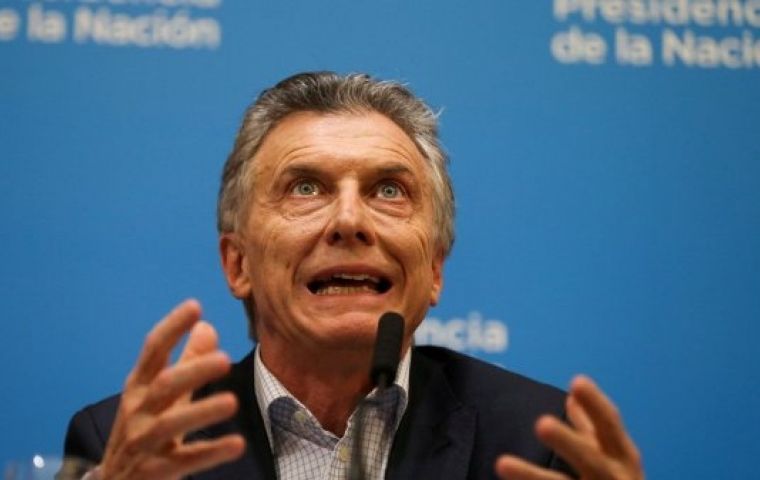MercoPress. South Atlantic News Agency
Argentina sells US$ 367m reserves to prop the Peso; country risk at another record level, 2.125 points
 The country risk rose 135 basis points to 2,125, its highest in 14 years, before partially recovering, according to the JP Morgan Emerging Markets Bond Index
The country risk rose 135 basis points to 2,125, its highest in 14 years, before partially recovering, according to the JP Morgan Emerging Markets Bond Index Argentina’s peso was battered on Wednesday as the central bank sold US$ 367 million of its dollar reserves in a second consecutive day of heavy intervention aimed at controlling the currency’s fall. Likewise the country risk rose 135 basis points to 2,125, its highest in 14 years, before partially recovering, according to the JP Morgan Emerging Markets Bond Index Plus.
The peso closed 3.1% weaker at 58.1 per dollar, traders said. The peso has lost almost 22% of its value against the U.S. dollar since Aug. 12.
The central bank issued a press release saying it would limit financing in pesos for major exporters, a move aimed at strengthening the local currency by encouraging companies to sell dollars in order to obtain pesos needed to fund operations.
“It is not clear whether firms will actually respond by selling foreign exchange, particularly in the current environment,” Edward Glossop, Latin America economist for Capital Economics commented.
“With capital flight picking up and concerns about the International Monetary Fund deal and debt restructuring still dominating, this is unlikely to prevent the peso from falling further,” he said.
A source from Argentina’s grains export sector said the measure was not likely to impact trade in grains and oilseed byproducts in Argentina, the world’s largest exporter of soy-meal livestock feed and soy oil.
“We understand that the central bank measure seeks to prevent banks from dollarizing their portfolios but agriculture exports did not enter into that operation,” the source said.
Despite Alberto Fernandez sweeping victory on the 11 August primary, and the fact he is considered an experienced prudent politician, investors fear Argentina could return to the interventionist policies of former President Cristina Fernandez de Kirchner, who is vice presidential candidate to Fernandez, and master of votes.
At the start of the week, Fernandez blamed Macri and the IMF for Argentina’s economic woes, spurring market fear that an eventual Fernandez presidency would lead to a severe break from Macri’s orthodox economic policies. On Wednesday finance minister Hernan Lacunza announced a package of measures, but before read a long statement calling for responsibility and prudence in helping to stabilize markets, combat inflation and defend middle and low class Argentines.
A clear indication the president Mauricio Macri administration was pointing fingers and blaming the black Tuesday on Fernandez statement accusing the Argentine government and IMF for the social catastrophe.
The central bank sold US$50 million of its reserves in its first dollar auction of the day at an average 58.833 pesos per dollar. Minutes later, it sold US$65 million more of its reserves at an average 58.7269 pesos per dollar, traders said. The bank quickly followed up with a third auction of US$55 million at an average 58.2354. In its fourth intervention, it sold US$21 million at an average 57.2346 pesos per dollar.
The bank sold US$71 million in reserves at an average 57.6684 in a fifth intervention, traders said, and in a sixth, sold US$91 million at an average 57.8757 pesos per dollar.
The bank sold another US$14 million of its reserves at 58.0511 pesos per dollar in a seventh intervention. In addition, the central bank sold US$60 million from the Treasury.
On Tuesday, the bank exceeded for the first time a guideline on reserve sales agreed as part of Argentina’s US$57 billion standby deal with the IMF, selling US$302 million in the foreign exchange market.
The agreement with the IMF limits Argentina’s central bank to US$250 million in reserve sales daily, set when the exchange rate was above 51.5 pesos per dollar, with the option to intervene further to “counteract episodes of excessive volatility”.




Top Comments
Disclaimer & comment rulesCommenting for this story is now closed.
If you have a Facebook account, become a fan and comment on our Facebook Page!